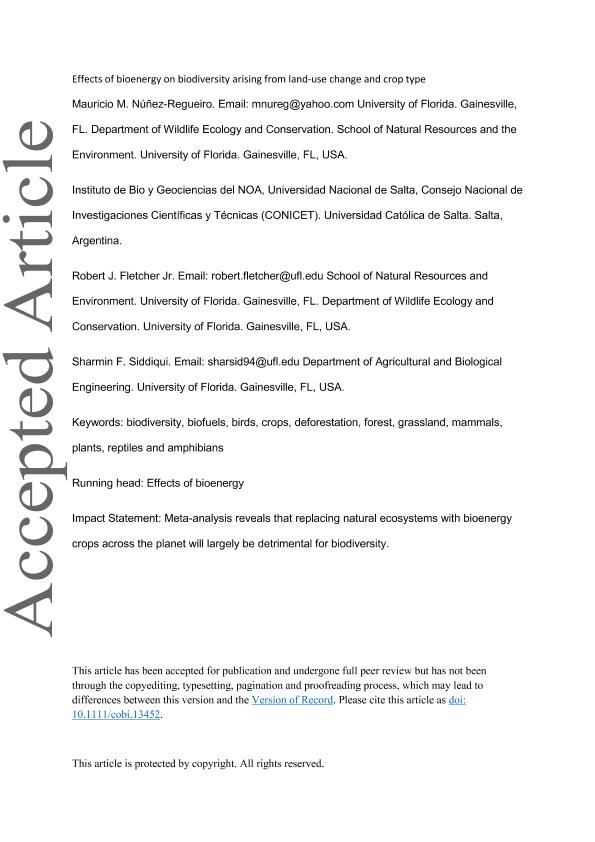Artículo
Effects of bioenergy on biodiversity arising from land-use change and crop type
Fecha de publicación:
19/12/2019
Editorial:
Wiley Blackwell Publishing, Inc
Revista:
Conservation Biology
ISSN:
0888-8892
e-ISSN:
1523-1739
Idioma:
Inglés
Tipo de recurso:
Artículo publicado
Clasificación temática:
Resumen
Understanding how the world's flora and fauna will respond to bioenergy expansion is critical. This issue is particularly pronounced considering bioenergy's potential role as a driver of land‐use change, the variety of production crops being considered and currently used for biomass, and the diversity of ecosystems that can potentially supply land for bioenergy across the planet. We conducted 2 global meta‐analyses to determine how 8 of the most commonly used bioenergy crops may affect site‐level biodiversity. One search was directed at finding data on biodiversity in different production land uses and the other at extracting energy‐yield estimates of potential bioenergy crops. We used linear mixed‐effect models to test whether effects on biodiversity varied with different individual bioenergy crop species, estimated energy yield, first‐ or second‐generation crops, type of reference ecosystem considered, and magnitude of vertical change in habitat structure between any given crop and the reference ecosystem. Species diversity and abundance were generally lower in crops considered for bioenergy relative to the natural ecosystems they may replace. First‐generation crops, derived from oils, sugars, and starches, tended to have greater effects than second‐generation crops, derived from lignocellulose, woody crops, or residues. Crop yield had nonlinear effects on abundance and, to a lesser extent, overall biodiversity; biodiversity effects were driven by negative yield effects for birds but not other taxa. Our results emphasize that replacing natural ecosystems with bioenergy crops across the planet will largely be detrimental for biodiversity, with first generation and high‐yield crops having the strongest negative effects. We argue that meeting energy goals with bioenergy using existing marginal lands or biomass extraction within existing production landscapes may provide more biodiversity‐friendly alternatives than conversion of natural ecosystems for biofuel production.
Archivos asociados
Licencia
Identificadores
Colecciones
Articulos(IBIGEO)
Articulos de INST.DE BIO Y GEOCIENCIAS DEL NOA
Articulos de INST.DE BIO Y GEOCIENCIAS DEL NOA
Citación
Nunez Regueiro, Mauricio Manuel; Siddiqui, Sharmin F.; Fletcher, Robert J.; Effects of bioenergy on biodiversity arising from land-use change and crop type; Wiley Blackwell Publishing, Inc; Conservation Biology; 2019; 19-12-2019; 1-32
Compartir
Altmétricas




